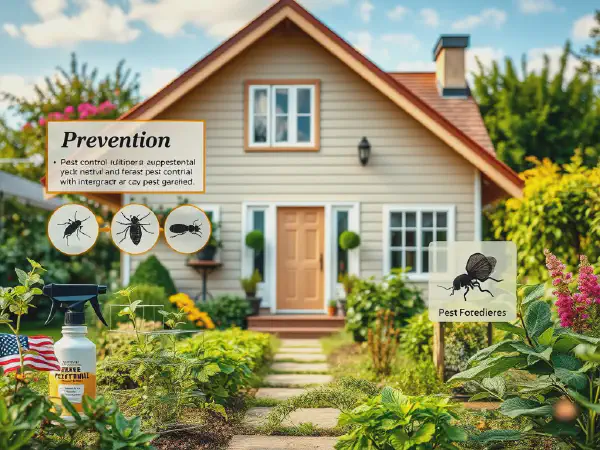Effective Strategies for Residential Pest Control

A Comprehensive Guide to Residential Pest Control
Residential pest control is essential for maintaining a safe and healthy home environment. Unwanted pests can infiltrate homes, causing damage and posing health risks to occupants. Effective pest management requires the right strategies to eliminate and prevent infestations, ensuring that your living space remains pest-free.
Implementing efficient residential pest control measures begins with understanding the common types of pests that invade homes. These include insects, rodents, and larger pests, each requiring different strategies for detection and eradication. Knowledge of your pest problem is key to developing a successful pest management plan.
Effective solutions for your home include regular inspections and treatments through Residential pest control services.
Identifying the signs of pests in your home is vital for prompt action in residential pest control. From droppings and trails to nests and gnaw marks, recognizing these signs early can prevent a small problem from escalating into a major infestation. Taking timely action protects your home and health from the adverse effects of pests.
Regular inspections, preventative measures, and proactive pest management can significantly reduce the chances of an infestation. Residential pest control is not just about treatment but also about understanding the behaviors of pests and their life cycles to implement strategies that deter future pests from establishing in your home.
In conclusion, residential pest control involves a combination of identification, prevention, and treatment. Homeowners must stay informed, vigilant, and ready to take action. Whether through DIY methods or hiring professionals, effective pest management ensures that your home remains safe and comfortable.
Types of Common Pests in Homes
Ants are one of the most common pests found in homes, often forming colonies that can quickly become a nuisance. Identifying ants includes recognizing trails and knowing the different types—such as carpenter ants and pavement ants—enabling effective treatment.
Rodent infestations present serious health risks, and signs include droppings, gnaw marks, and nesting materials. Understanding how to recognize these signs and act quickly can help manage the problem before it escalates into a full-blown infestation.
Household insects like cockroaches, spiders, and bedbugs exhibit specific behaviors that can signal an infestation. Knowing their habits, such as where they live and what attracts them, can assist in forming a targeted pest control strategy.
Termite detection is crucial; they can cause significant structural damage before homeowners realize they are present. Regular inspections and preemptive measures are critical for termite detection and prevention.
Preventative Measures for Pest Control
Sealing entry points is fundamental in preventing pests from entering your home. This includes caulking gaps around windows and doors and repairing any cracks in your foundation.
Proper sanitation plays a crucial role in pest prevention. Keeping food stored properly, maintaining clean living spaces, and promptly disposing of waste can deter many pests from making your home their habitat.
Landscaping can either attract or repel pests. Using plants that repel insects and maintaining your garden can minimize the chances of pests encroaching on your property.
Natural repellents, such as vinegar and essential oils, can effectively prevent pests from entering your home without using harsh chemicals. They can be sprayed in areas prone to pest activity.
DIY Residential Pest Control Strategies
Homemade traps and deterrents are cost-effective solutions for managing small pest issues. Many common pests can be caught using traps made from household items or natural ingredients.
Natural remedies like diatomaceous earth or baking soda can effectively manage common pests without harmful side effects. They are particularly useful for roaches and other insects.
Essential oils not only provide a pleasant aroma but also deter pests such as mosquitoes, ants, and spiders when used in sprays or diffusers.
Creating a pest control schedule can help homeowners stay organized and proactive in preventing infestations. Regularly checking for signs of pests, particularly during peak pest seasons, is essential for effective control.
Professional Pest Control Services
Hiring pest control professionals provides several benefits, including expert knowledge, advanced treatments, and guaranteed results. They can tackle pest problems that homeowners may not manage effectively on their own.
During a pest control service, professionals typically assess the situation, apply appropriate treatments, and provide advice on preventing future infestations. It often involves a thorough inspection and targeted application of pesticides or traps.
When evaluating pest control companies, check for licensing, insurance, and customer reviews. Asking for detailed treatment plans and costs upfront will help in making an informed decision.
Costs associated with professional pest control can vary based on the severity of the infestation, the type of pests involved, and the services required. It is essential to understand what the service includes.
Health Risks Associated with Pests
Pests can introduce allergens into your home through droppings, urine, and skin flakes. Understanding these allergens is vital for maintaining a healthy environment, particularly for allergy sufferers.
Many household pests can transmit diseases, including rodents that can carry hantavirus, and insects that can transmit Lyme disease or West Nile Virus. Awareness of these risks is essential for taking precautions.
Pest infestations can significantly impact your family's health, causing stress and anxiety. Recognizing this impact motivates homeowners to engage in proactive pest control practices.
Implementing preventive health measures against pests includes regular cleaning, sealing entry points, and using natural or professional pest control solutions.
Seasonal Pest Control Insights
Pest behavior changes with the seasons. For example, insects may seek shelter indoors during colder months, making it important to adjust your pest control strategy accordingly.
In spring, preparations for pest control should include inspecting for signs of pests that re-emerge after winter and addressing any vulnerabilities in your home.
As the weather shifts into fall, homeowners should focus on sealing entry points and making sure outdoor spaces are tidy to minimize pests looking for winter shelter.
Winterizing homes against pests involves ensuring that any entry points are sealed and that food sources are properly stored to prevent rodents and insects from moving indoors during cold weather.
